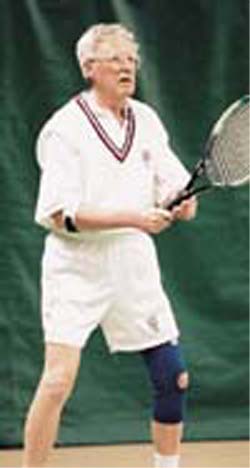
Testimony of Stuart Awbrey
TESTIMONY OF STUART AWBREY
WESTFIELD, NEW JERSEY
Presented to the Senate Special Committee on Aging
March 23, 1999
Good morning, Senator Grassley, and other distinguished members of the Senate Aging Committee. I feel privileged to be here with you today to share my story.
It doesn't seem so long ago that I was working here, as a lanky 16-year-old page boy from Kansas. In fact, I still remember a terrifying March morning, 45 years ago, when I walked into the well of the House to find a Congressman lying on the floor, writhing in pain with a bullet in his chest. That was my first sight of deadly fire. Typically, that incident did not scare me away. Later, I returned to Capitol Hill to write speeches for Congressman Sid Yates of Chicago and as a public information officer of the Peace Corps, under Sarge Shriver. Those were exciting times.
Little did I know, 40 years ago, that one day I would be faced with another lethal bullet. The second attack would be a "silent bullet" and it would eventually kill me. I call it "my hidden adversary"; others call it Alzheimer's Disease. Unlike the Congressman whose doctors had the tools to heal his wounds, I would not find a cure for my condition. Perhaps that will happen in the future, with your help.
Let me tell you how it happened. Four and a half years ago, at age 56, 1 was editor of the New Jersey Lawyer, a 12,000 circulation weekly publication for the legal profession. Prior to that I had owned and edited my own weekly newspaper, along with my wife, Bev. I had my warning signs and symptoms, but was cruising along in my job, managing as best I could. So imagine my surprise when I was told, after an extensive medical workup, that I had the symptoms of early onset Alzheimer's disease.
When the doctor told me of my plight I was in a state of total shock. My life was now twisting out of control and I felt as if I was heading for a nose dive. That very same day I was told to stop working and stop driving; I did both, although I was having trouble absorbing the implications of my actions. In the next few days we began the arduous task of telling our families and children. Words cannot describe the poignancy, or sadness of those moments. Or the support and incredible love which I received from my family.
Within the month I began slowly to adapt to my new destiny, focusing on the activities I could still enjoy. I decided to record my memories, knowing that I would eventually forget my past. I wrote a book, CHRONICLES OF A COMMUNITY JOURNALIST, which was published a few years ago. I'm told it's a pretty good read. In addition to writing, I also wanted to have quality time with my family and travel to some favorite places. I needed to keep on learning and stay active. A tennis buff, I planned on playing as much as possible. Right now I continue to do all these things, although in dark moments I can't help but be aware that my time is running out.
At this point I cannot add or subtract, so Bev takes care of all the business. Although I can understand conversations, it is harder for me to process them. I'm having trouble finding the right words and organizing my thoughts. Speech writing is too complicated for me, so I had to turn to Bev for help with this. I tire easily, have trouble making phone calls, feel less confident and often don't have much to say. My past is slipping away from me.
I can't allow myself to be preoccupied with the losses of the future - my longing to grow old along with my wife, sharing precious moments with my daughters and grandchildren. Instead, I focus on the present, living each day to its fullest.
I have done what I can to prepare for the inevitable: all the necessary legal and financial plans have been put into place. As I require more assistance we will hire a live-in caretaker to help when Bev is at work. Naturally, I want to remain independent as long as possible. But when the time comes, we anticipate that a nursing home will be necessary. The emotional and financial burdens this will place on the family are painfully obvious to all of you sitting here today.
In case you are wondering about how I'm dealing with "the silent bullet", I would have to say that I am making the most of my time, and taking stock in what I have. I have had a good life. I really believe this. I have been fortunate to have been able to do the things I've wanted to do, and I am grateful for that. Our years owning a weekly newspaper were challenging and exciting. As a father I helped raise two delightful, sensitive, capable and loving daughters and am pleased with the directions their lives are taking. I have a loving wife, supportive family, and many wonderful friends. So at this time I have chosen to acknowledge these blessings.
I will continue to focus on what is possible, rather than dwell on my limitations. I want to make the most of the good time that's left. And finally, I am pleased to be able to make this contribution by speaking to you today.
May others not have to travel as I have. But should they face their own silent bullet, may they benefit from the caring support network of the Alzheimer's Association.
In closing, I want to urge this Committee to do what you can, now, to fight this deadly disease. So many of us will be grateful for your efforts.
Thank you, for giving me the opportunity to share my experiences with you today.
